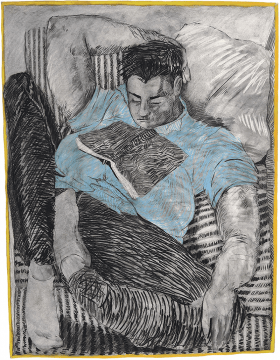Garth Greenwell in Harper’s:
 The word “relevant,” I was recently surprised to discover, shares an etymology with the word “relieve.” This seems obvious enough once you know it—only a few letters separate the words—but their usages diverged so long ago that I had never associated them before. Searching out etymologies is an old habit, picked up in the decades when I aspired to be a poet. Language is fossil poetry, Emerson says, and the poem the Oxford English Dictionary lays out in this case is remarkably moving. The common forebear of both “relevant” and “relieve” is the French relever, which meant, originally, to put back into an upright position, to raise again, a word that twisted through time, scattering meanings that our two modern words have apportioned between them: to ease pain or discomfort, to make stand out, to render prominent or distinct, to rise up or rebel, to rebuild, to reinvigorate, to make higher, to set free.
The word “relevant,” I was recently surprised to discover, shares an etymology with the word “relieve.” This seems obvious enough once you know it—only a few letters separate the words—but their usages diverged so long ago that I had never associated them before. Searching out etymologies is an old habit, picked up in the decades when I aspired to be a poet. Language is fossil poetry, Emerson says, and the poem the Oxford English Dictionary lays out in this case is remarkably moving. The common forebear of both “relevant” and “relieve” is the French relever, which meant, originally, to put back into an upright position, to raise again, a word that twisted through time, scattering meanings that our two modern words have apportioned between them: to ease pain or discomfort, to make stand out, to render prominent or distinct, to rise up or rebel, to rebuild, to reinvigorate, to make higher, to set free.
I looked up this history because I realized that somehow I’d lost my sense of what we mean when we talk about “relevance,” especially the relevance of art, and I wanted to know whether the problem lay in my own understanding or in some deficiency in our usage. The word is everywhere in blurbs and reviews as a quality to admire or, more than that, as a necessary condition; “irrelevant” has joined “problematic” as a term of absolute dismissal, applied not so much to books one reads and hotly debates as to books one needn’t read at all. Artists feel the anxiety of relevance during every season of fellowship applications, those rituals of supplication, when we have to make a case for ourselves in a way that feels entirely foreign, for me at least, to the real motivations of art. Why is this the right project for this moment? these applications often ask. If I had a question like that on my mind as I tried to make art, I would never write another word. This pressure has only increased in recent years. I can still remember the shudder I felt in early 2017 when, after expressing my desire to review a newly translated European novel, an editor asked me to find “a Trump angle” to make the book relevant to his magazine’s readers. There’s something demeaning about approaching art from a predetermined angle, all the more so when that angle is determined by our current president.
More here.
